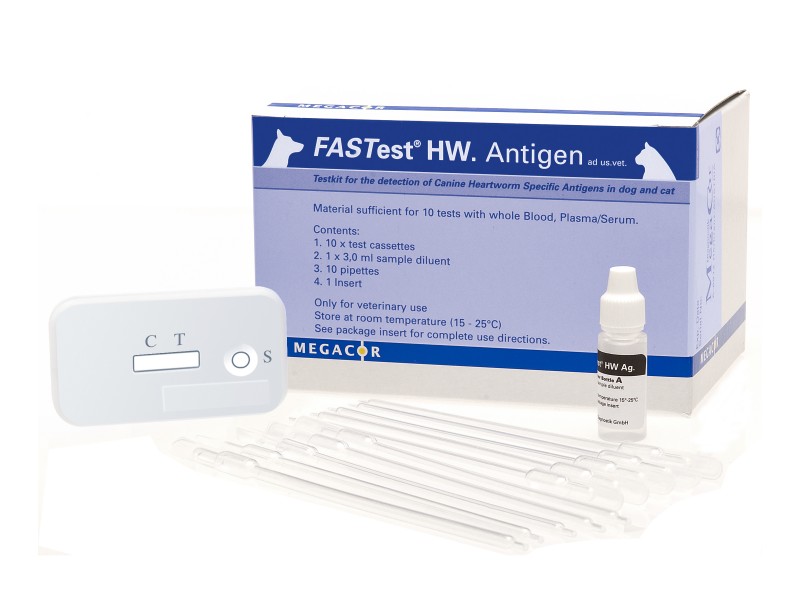Description
Qualitative Detection of Dirofilaria immitis Specific Antigens
Test applicable to: Dog & Cat
Samples: Whole Blood, Serum and Plasma
FASTest Heartworm Ag is a rapid immunochromatographic test for the detection of Canine-Feline Dirofilaria immitis infection in the whole blood, serum or plasma of dog, cats and other mammals.
Heartworm or the parasitic worm Dirofilariosis is usually found in warmer climates such as South America, America (middle and southern regions), Eastern Asia and also the Mediterranean including Italy, Spain and Greece. Cases have also been found in Switzerland.
A primarily disease in dogs, the Heartworm parasite can infect other species; however, diagnosis of Heartworm in cats is more complicated. This is due to low prevalence, vague clinical symptoms and scarcity of circulating antigens, which makes FASTest HW Ag for cats a more accurate and convenient method for the prediction of microfilariae infections.
FASTest Heartworm Product Information – PDF Download
Why Test?
Why is it important to test for Heartworm Ag?
Dirofilaria immitis is the main cause of Heartworm in dogs and cats. A small filarial nematode whose immature stages are transmitted by mosquitos to animals. Adult heartworms are usually found living in the heart and large blood vessels adjacent to the animal’s heart. Although Heartworm is normally found in dogs, it can also infect cats, ferrets and other mammal’s, especially canine related species.
Symptoms
What are the symptoms of Heartworm?
Signs of Heartworm can vary from animal to animal. Not all symptoms appear on the onset of the infection but can take years to develop.
Mild signs of Heartworm are tiredness, the animal becomes uninterested and unable to cope with strenuous exercise. Some animals may also develop a cough.
Advance and more aggressive infections can result in heart failure, respiratory damage and damage to the lungs and liver.
Symptoms of Heartworm can include:
- Breathing difficulties
- Coughing
- Coughing with blood present
- Wheezing
- Abdominal swelling due to fluid accumulation
- Fatigue
- Weight loss
- Poor overall condition of the animal
It may be possible to treat Heartworm with medication but this is often expensive and is difficult to treat in the later stages of the disease.
Instructions For Use & Fact Sheet
Feline Heartworm Fact Sheet


